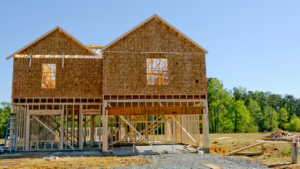
Dear Claire: What are the Different Kinds of Loans?
Understanding Your Mortgage Options: FHA, Conventional, VA, USDA, and Jumbo Loans Explained
Most of the time, you’re going to hear about are Federal Housing Authority (FHA) loans. These are government-backed loans. Because they’re government-backed loans, lenders are willing to take a little bit more of a risk. They might take you on if you don’t have a great credit score, and you’ll have to come up with a lot less for a down payment. The interest rate on FHA loans is going to typically be higher, and there’s mortgage insurance, which you cannot remove unless you refinance the home. FHA is a great loan for somebody who just falls outside of the box of a normal conventional loan.
Conventional loans are what most people get. It comes with a wide range of down payments: you can do 3%, 5% 10%, 15%, 20% and 25% or above that. You can also put more down; however, above that you’re not going to get any benefit on your interest rate and the mortgage insurance is going to be gone so there’s really no reason to go above that except maybe if you want your payment to be a certain number so you can do it for that reason on both FHA and conventional loans. All VA and USDA loans have specific caps on how much the loan can be. In the city of Portland, it’s about $548,000. Every year, it can change, but it doesn’t always change. The government decides, “Hey, you’re meeting house prices so we’re going to allow conventional loans up to x.”
Like I said, that can change, but it doesn’t always change. And it depends on the federal government. VA loans are, of course, for veterans only. You must have your veteran certificate, which goes towards you being able to qualify for the home. It’s actually for the home loan, it’s actually a guideline that has to be satisfied before they’ll give you the loan and there’s a limit on how much you can be loaned at any given time. Let me explain how that comes into play. None of these following numbers are true but say the loan limit for all your loans as a veteran are $400,000. You could have a principal residence and maybe buy a second residence after a certain amount of time, but the total of those two loans cannot go above what your certificate says. So, if it’s $400,000, you could have two houses with two loans at $200,000. This is super important, because a VA loan is unlike any other loan, where you can get a zero down interest rate that is mind-blowingly unbelievable. I’ve seen one in the last six months that was almost 2%. They are a great loan if you can get them, but there are a few hoops you have to jump through to get it.
The other loan that you’re going to see pretty often in Portland is called a jumbo loan. A jumbo loan is a loan that you can get pretty much through any bank, anywhere. It’s just going to fall above those conventional loan guidelines or conventional loan limits. Typically, it’s going to be what they call the private sector because the federal government isn’t backing that loan. Again, there are a quasi-governmental organizations called Fannie Mae and Freddie, Mac, and Sallie Mae. All those organizations back loans. So they actually have a home marketplace for selling and buying conventional loans all the time. That’s how they continually get fresh money into their accounts so they can continue to make loans, and it’s the loan cycle of life. So jumbo loans are above that limit; they’re a different market that is not backed by the government, and they’re sometimes a little riskier. Often, the interest rate is a little bit higher, and the guidelines are stricter. Your credit score must be higher. You must have more assets in the bank. You must have more income — that kind of thing.
With all of this, if you look into an umbrella, the two things you could have in all of these is a fixed rate or an address for most people across the board for doing fixed rate, interest loans. So, what does that mean? That means they won my interest rate. That’s what most people are opting for because the interest rate is so low. When I got my first house, I actually got an adjustable-rate mortgage because, typically in a higher interest rate market, adjustable rates are lower and then they start going up. So, I think I bought my first house at like a 6% interest rate and that was way better than what was normal because normal was like running around seven-ish. It makes a big difference and it makes it more affordable. There’s a bunch of other loans out there too, of course.
If you have any questions about anything, just let me know. I have great lenders to refer you to, but I’m always interested to hear what questions you have about this. This world changes often and is super complex. If you want to check out other videos that we have about loans, go to our Paris Group Realty, LLC YouTube channel and we’ll see you next week.
Have more questions or want professional advice on buying or selling a home?
Contact us at [email protected] or (503) 926-5213. We’re here to address all your real estate needs!




